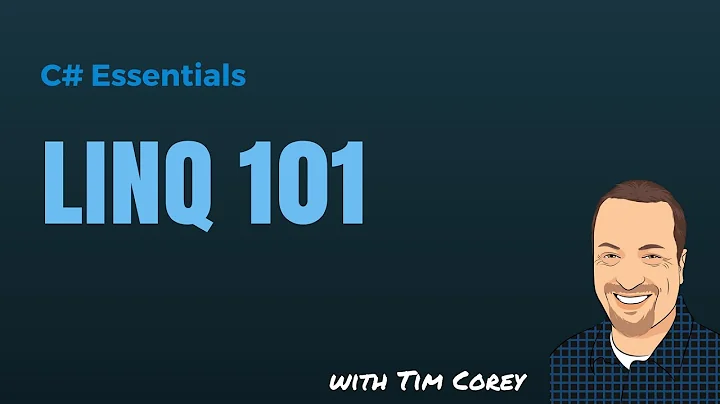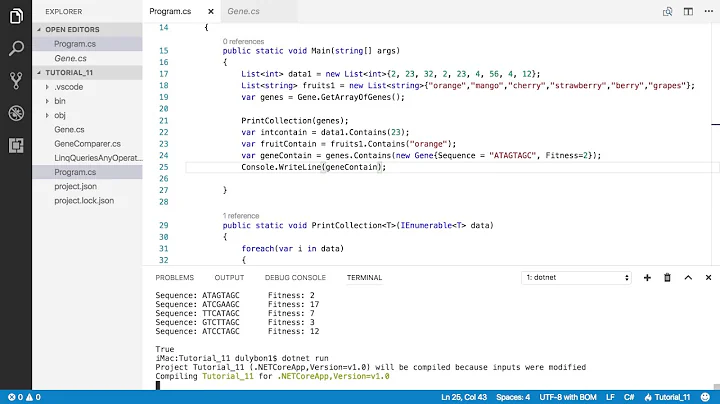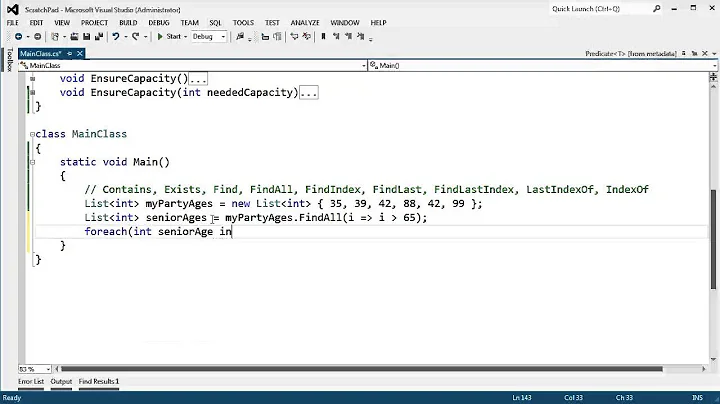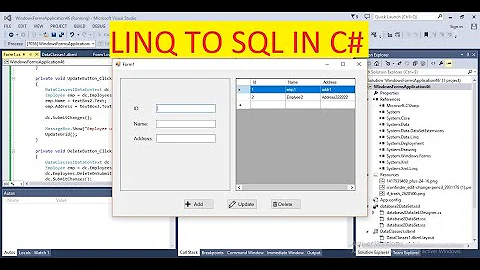LINQ: Select where object does not contain items from list
Solution 1
In general, you're looking for the "Except" extension.
var rejectStatus = GenerateRejectStatuses();
var fullList = GenerateFullList();
var rejectList = fullList.Where(i => rejectStatus.Contains(i.Status));
var filteredList = fullList.Except(rejectList);
In this example, GenerateRegectStatuses() should be the list of statuses you wish to reject (or in more concrete terms based on your example, a List<int> of IDs)
Solution 2
dump this into a more specific collection of just the ids you don't want
var notTheseBarIds = filterBars.Select(fb => fb.BarId);
then try this:
fooSelect = (from f in fooBunch
where !notTheseBarIds.Contains(f.BarId)
select f).ToList();
or this:
fooSelect = fooBunch.Where(f => !notTheseBarIds.Contains(f.BarId)).ToList();
Solution 3
I have not tried this, so I am not guarantueeing anything, however
foreach Bar f in filterBars
{
search(f)
}
Foo search(Bar b)
{
fooSelect = (from f in fooBunch
where !(from b in f.BarList select b.BarId).Contains(b.ID)
select f).ToList();
return fooSelect;
}
Solution 4
Try this simple LINQ:
//For a file list/array
var files = Directory.GetFiles(folderPath, "*.*", SearchOption.AllDirectories);
//simply use Where ! x.Contains
var notContain = files.Where(x => ! x.Contains(@"\$RECYCLE.BIN\")).ToList();
//Or use Except()
var containing = files.Where(x => x.Contains(@"\$RECYCLE.BIN\")).ToList();
notContain = files.Except(containing).ToList();
Related videos on Youtube
farina
I'm the interesting mix between a graphic designer and computer programmer that only happens when you drop your baby in a vat of acid during a full moon. http://www.linkedin.com/in/mjfarina
Updated on January 11, 2020Comments
-
farina over 4 years
I'm struggling with LINQ syntax here...thought I'd toss it out here. I cant find exactly what I'm looking for anywhere else.
OK, say I've got this:
public class Bar { public int BarId { get; set; } } public class Foo { public List<Bar> BarList { get; set; } } List<Foo> fooBunch = GetABunchOfFoos(); //let's just assume I'm getting more than one List<Foo> fooSelect = new List<Foo>; List<Bar> filterBars = GetAFewBars(); //assume I'm getting like 2 or 3 fooSelect = (from f in fooBunch where !(from b in f.BarList select b.BarId).Contains(ITEM FROM filterBars.BarId) select f).ToList();So, long story short I want to use LINQ to filter out my list of objects based on objects from another list. I hope this makes sense. I think I'm just lost on the Contains portion...I don't know how to write that.
-
farina about 13 yearsThis is really close...the trick would be to create the rejectList from dynamic statuses. It would be more like where i => i.Status in(list<statuses>). Can I do something like that? Basically another LINQ statement I guess?
-
farina about 13 yearsFrom what I can tell, b.ID doesn't compile. The Contains method seems to loose context of b.
-
Thebigcheeze about 13 yearsAbsolutely, to build the rejectList, you'd just have to devise a way to get a list of rejects you don't want. For example:
var rejectList = fullList.Where(i => rejectStatuses.Contains(i.Status));I'll update my original answer to reflect this change. -
 Justin Morgan about 13 yearsYou're using two variables named
Justin Morgan about 13 yearsYou're using two variables namedb, and the compiler probably finds it ambiguous. -
 JoshYates1980 about 9 yearsNice. i like this answer better. +1
JoshYates1980 about 9 yearsNice. i like this answer better. +1 -
JustJohn almost 8 yearsHow would I do this in just one line? I understand it might not be possible.
-
 Rarepuppers about 6 yearsThis answer is better than the selected
Rarepuppers about 6 yearsThis answer is better than the selected -
 Cata Hotea over 5 yearsClean and simple ! Nice
Cata Hotea over 5 yearsClean and simple ! Nice -
 jleach about 5 years@Rarepuppers - I spend a few minutes trying to understand the accepted answer, then looked here to see suggested what I already typed before I knew for sure if it worked that way...
jleach about 5 years@Rarepuppers - I spend a few minutes trying to understand the accepted answer, then looked here to see suggested what I already typed before I knew for sure if it worked that way... -
Xonshiz about 4 yearsThis should be the accepted answer. I've been looking to UNDERSTAND how it works. Thanks a ton!











